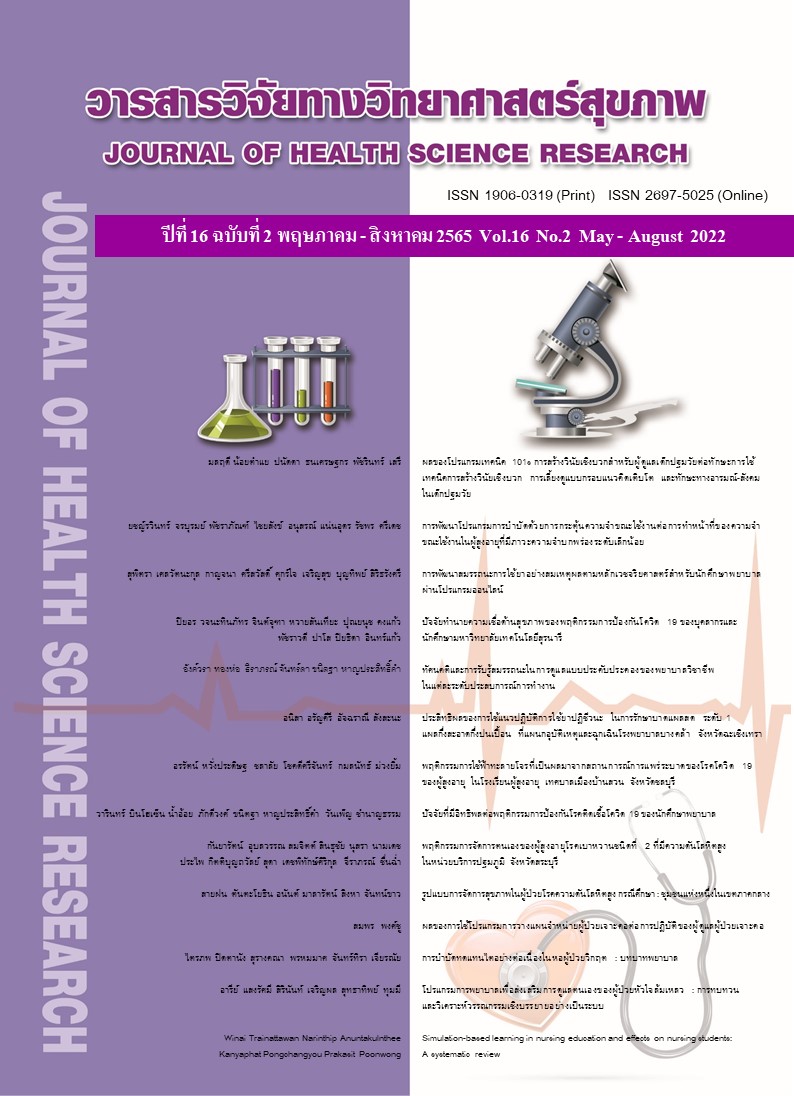พฤติกรรมการจัดการตนเองของผู้สูงอายุโรคเบาหวานชนิดที่ 2 ที่มีความดันโลหิตสูง ในหน่วยบริการปฐมภูมิ จังหวัดสระบุรี
Main Article Content
บทคัดย่อ
บทนำ : โรคเบาหวานชนิดที่ 2 พบได้มากในผู้สูงอายุซึ่งส่วนใหญ่พบว่ามีโรคความดันโลหิตสูงร่วมด้วย ผู้ป่วยที่ควบคุมระดับน้ำตาลในเลือดไม่ได้จะส่งผลทำให้เกิดภาวะแทรกซ้อนต่าง ๆ การจัดการตนเองเป็นกิจกรรมที่ผู้ป่วยปฏิบัติเพื่อควบคุมโรคและภาวะแทรกซ้อนที่จะเกิดขึ้น
วัตถุประสงค์การวิจัย : เพื่อศึกษาพฤติกรรมการจัดการตนเองของผู้สูงอายุโรคเบาหวานชนิดที่ 2 ที่มีความดันโลหิตสูงในหน่วยบริการปฐมภูมิ จังหวัดสระบุรี
วิธีการวิจัย : เป็นการวิจัยเชิงพรรณนาภาคตัดขวาง เก็บข้อมูลจากผู้สูงอายุโรคเบาหวานชนิดที่ 2 ที่มีความดันโลหิตสูง มารักษาที่หน่วยบริการปฐมภูมิ ในจังหวัดสระบุรี จำนวน 336 คน เครื่องมือที่ใช้ในการวิจัย ประกอบด้วย แบบสอบถามข้อมูลทั่วไป และแบบสัมภาษณ์พฤติกรรมการจัดการตนเอง มีค่าความเที่ยงเท่ากับ .70 วิเคราะห์ข้อมูลด้วยสถิติเชิงพรรณนา
ผลการวิจัย : พบว่า ตัวอย่างส่วนใหญ่มีการจัดการตนเองโดยรวมอยู่ในระดับปานกลาง รองลงมาระดับไม่ดี และระดับดี ร้อยละ 58.93, 25.60 และ 15.47 ตามลำดับ โดยพบว่า การจัดการตนเองด้านการรับประทานอาหาร การดูแลเท้า และด้านอารมณ์อยู่ในระดับปานกลาง ส่วนด้านการใช้ยาอยู่ในระดับดี และด้านการออกกำลังกายอยู่ในระดับไม่ดี
สรุปผล : ตัวอย่างมีการจัดการตนเองโดยรวมอยู่ในระดับปานกลาง โดยมีการจัดการตนเองด้านการออกกำลังกายยังไม่เหมาะสม ดังนั้นจึงควรส่งเสริมให้ผู้ป่วยมีพฤติกรรมการจัดการตนเองด้านการออกกำลังกาย รวมทั้งการรับประทานอาหาร การดูแลเท้า การจัดการอารมณ์ และการใช้ยาให้ดียิ่งขึ้น
Downloads
Article Details

อนุญาตภายใต้เงื่อนไข Creative Commons Attribution-NonCommercial-NoDerivatives 4.0 International License.
บทความที่ได้รับการตีพิมพ์เป็นลิขสิทธิ์ของวิทยาลัยพยาบาลบรมราชชนนี จังหวัดนนทบุรี
ข้อความที่ปรากฏในบทความแต่ละเรื่องในวารสารวิชาการเล่มนี้เป็นความคิดเห็นส่วนตัวของผู้เขียนแต่ละท่านไม่เกี่ยวข้องกับวิทยาลัยพยาบาลบรมราชชนนี จังหวัดนนทบุรี และคณาจารย์ท่านอื่น ในวิทยาลัยฯ แต่อย่างใด ความรับผิดชอบองค์ประกอบทั้งหมดของบทความแต่ละเรื่องเป็นของผู้เขียนแต่ละท่าน หากมีความผิดพลาดใด ๆ ผู้เขียนแต่ละท่านจะรับผิดชอบบทความของตนเองแต่ผู้เดียว
เอกสารอ้างอิง
World Health Organization. Global report on diabetes. [Internet]. 2016 [cited 2021 Nov 4]; Available from: https://www.who. int/diabetes/global-report/en/.
Department of Health Disease Control Bureau of Risk Communication and Health Behavior Development. Department of Disease Control, campaign on World Diabetes Day 2021 [Internet]. 2021 [cited 2022 Jan 2]; Available from: https://ddc. moph.go.th/brc/new.php?news=21692& deptcode=brc. (in Thai).
Aekplakor W. Report of the survey of the Thai people by physical examination 6th, 2019-2020. Bangkok: Graphic and Design Publishing House; 2016. (in Thai).
Rattarasarn C. Current situation and cooperation to reform diabetes care in Thailand [Internet]. 2017 [cited 2021 Dec 2]; Available from: https://www. novonordisk. com/content/dam/Denmark/HQ/sustainable business/performance-on-tbl/more-about-how-we-work/CreatingTH.pdf. (in Thai).
LeRoith D, Biessels GJ, Braithwaite SS, Casanueva FF, Draznin B, et al. Treatment of diabetes in older adults: An endocrine society clinical practice guideline. J Clin Endocinol Metab. 2019: 104(5):1520-74. doi: 10.1210/jc.2019-00198.
Yandrapalli S, Pal S, Nabors C, Aronow WS. Drug treatment of hypertension in older patients with diabetes mellitus. Expert Opin Pharmacother. 2018:19(7):633–42. doi: 10.1080/14656566.2018.1456529.
Harada M, Fujihara K, Osawa T, Yamamoto M, Kaneko M, Matsubayashi Y, et al. Effects of treatment-achieved HbA1c on incidence of micro-/macrovascular complications in patients with diabetes mellitus. Diabetes. 2018;67(suppl1):444. doi: 10.2337/db18-444-p.
Adu MD, Malabu UH, Malau-Aduli AEO, Malau-Aduli BS. Enablers and barriers to effective diabetes self-management: A multi-national investigation. PLoS One. 2019;14(6):e0217771. doi: 10.1371/journal. pone.0217771.
Lambrinou E, Hansen TB, Beulens JW. Lifestyle factors, self-management and patient empowerment in diabetes care. Eur J Prev Cardiol. 2019;26(Suppl2):55-63. doi: 10.1177/2047487319885455.
Sami W, Ansari T, Butt NS, Hamid MRA. Effect of diet on type 2 diabetes mellitus: A review. Int J Health Sci (Qassim). 2017;11(2):65-71. PMID:28539866.
Jannoo Z, Mamode Khan N. Medication adherence and diabetes self-care activities among patients with type 2 diabetes mellitus. Value Health Reg Issues. 2019;18:30-35. doi: 10.1016/j. vhri.2018.06.003.
Bonner T, Foster M, Spears-Lanoix E. Type 2 diabetes-related foot care knowledge and foot self-care practice interventions in the United States: A systematic review of the literature. Diabet Foot Ankle. 2016;7:29758. doi: 10.3402/ dfa.v7.29758.
Yingyongmatee N, Yucharoen D, Sawangchai J, Wonglamthong S, Nimitpornchai P. The effectiveness of SKT’s meditation therapy on glucose levels in diabetic patients with poor glycemic control. Region 4-5 Medical Journal. 2020;39(2):75-85. (in Thai).
Department of Disease Control Division of Non Communicable disease, Annual report Bureau of Non Communicable disease. [Internet]. 2017. [cited 2021 Jul 15]; Available from: http://www.t haincd. com/2016/media-detail.php?id=12986&tid= 30&gid=1-015-008. (in Thai).
Lorig KR, Holman HR. Self-management education: History, definition, outcomes, and mechanisms. Ann Behav Med. 2003;26(1):1-7.
American Diabetes Association. Life stye management. Diabetes Care. 2019;42 (Suppl.1):S46-S60. doi. 10.23 37/dc19-S005.
Burn N, Grove SK. The Practice of Nursing Research Conduct, Critique and Utilization. 5thed. Philadelphia: W.B. Saunders, Missouri; 2005.
Toobert DJ, Hampson SE, Glasgow RE. The summary of diabetes self-care activities measure: results from 7 studies and a revised scale. Diabetes Care. 2000; 23(7):943-50. doi: 10.2337/diacare.23.7. 943.
Noppakraw J. Health literacy and self-management in older person with type 2 diabetes mellitus [Thesis]. Chiang Mai: Chiang Mai University; 2017. (in Thai).
Jakkaew K. Self-care of elderly with diabetes in Loungnuae sub-district, Doi Saket distric, Chiang Mai province [Thesis]. Chiang Mai: Chiang Mai Rajabhat University; 2018. (in Thai).
Meiner SE, Yeager JJ. Gerontologic nursing. 6th. St Louis: Elsevier Inc; 2019.
Saad AMJ, Younes ZMH, Ahmed H, Brown JA, Al Owesie RM, Hassoun AAK. Self-efficacy, self-care and glycemic control in Saudi Arabian patients with type 2 diabetes mellitus: A cross-sectional survey. Diabetes Res Clin Pract. 2018;137:28-36. doi: 10.1016/j.diabres.2017.12.014.
Khatichop N. Factors influencing daily foot care behaviors among diabetic persons with peripheral neuropathy in community [Thesis]. Chiang Mai: Chiang Mai University; 2017. (in Thai).
Thojampa S. Knowledge and self-care management of the uncontrolled diabetes patients. Int J Afr Nurs Sci. 2019;10:1-5. doi: 10.1016/j.ijans.2018.11.002.


